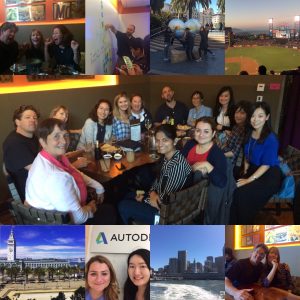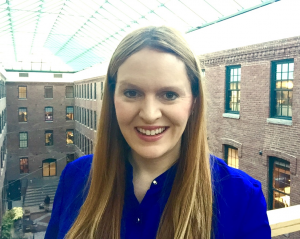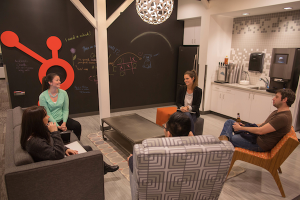
MA Translation & Localization Management
English/ French
Growing up in a multicultural environment, Gaya Saghatelyan has always been passionate about languages and culture. In college, Gaya studied Business Administration at a French business school. As an undergraduate student, she worked for the Embassy of Switzerland in Armenia as an in-house translator and interpreter (English/French/Russian/Armenian) — that’s how she discovered her passion for the language profession. Upon graduation, Gaya decided to leave the language industry and start a career in business administration. But not for long. After a year of working for a software company based in Los Angeles, she began to feel that something was missing in her career and decided to “go back to her roots,” as she puts it. Gaya is currently pursuing an MA in Translation and Localization Management, where she combines her passion for languages, technology and business.
This summer, Gaya did a 3-month Localization Program Management internship at Autodesk, a 3D design software company based in San Rafael. Gaya talked about her experience at Autodesk during my Career Management class. I did a follow up interview with her to learn more about the internship.
Q1: What were your top 3 criteria as you selected your internship(s)?
- Location: I looked for an internship in the US and abroad. I was especially interested in doing an internship in France to practice my B language and learn from a different business culture. On the other hand, I wanted to expose myself to software localization, and the Bay Area was perfect for that.
- LSP or Client: I wanted to gain experience in project/ program management working for an LSP, because it offers a versatile learning environment. I also wanted to explore software localization and experience what it would be like to work for a big company.
- The environment: In the process of interviewing for different internships, I paid attention to the overall dynamic and atmosphere between myself and the hiring manager. It was important to me that the company (and the hiring manager) have specific objectives for the internship and an internship plan. I wanted to make sure that the hiring manager could be my mentor.
Q2: What did you learn about your field during your internship?
I learned that localization can sometimes be perceived as a cost center, therefore one of the most important roles of a program manager in localization is to control cost, evangelize localization best-practices and create a long-lasting relationship with stakeholders.
In addition, I learned that software localization is evolving rapidly in response to changes in software development practices. The cadence of software localization is strongly dependent on the software release cycle, which requires localization teams to adopt a continuous localization strategy.
Finally, as a localization program manager, your role is very diverse: from cost management to vendor communication, from knowledge management to stakeholder analysis — there’s never a dull day!
Q3: What did you learn about yourself during your internship?

During my internship I discovered, once again, that human interaction and collaboration are very important to me. I also learned that I thrive in a dynamic environment where I can learn new things and work with different teams. Lastly, I realized that although I didn’t particularly enjoy accounting and finance in college, I love numbers! Anytime I was faced with a new task or wanted to understand how a project was structured, I turned to the data.
Q4: From the employers’ perspective what does a good intern look like?
A good intern takes initiative to benefit from the experience and contribute to the team. As an intern, you may think you don’t have a lot to contribute, but you do! A good intern observes and asks questions with the purpose of understanding the business and contributing fresh insights. A good intern also interacts with everyone on the team and takes initiative to become a part of the company culture.
Q5: Any words of wisdom you would like to share?
These are things that I think made my internship successful and I hope they will help students during their future internships:
- Find a mentor: Work closely with your manager and express interest in projects.
- Be open to new opportunities: You may be set on a specific career path you want to pursue, but you never know where the road may take you! Be open to exploring new opportunities.
- Use what you learn at MIIS: I didn’t know all the tools and processes when I started my internship, but what I learned during my first year at MIIS taught me to think like a localization manager.
- Do a final presentation: At the end of your internship, ask your Manager for a review of your work and suggest doing a final presentation for the team you worked with. This will leave a lasting impression on your team and showcase, once again, your growth throughout the summer.
- Stay in touch: Make connections with everyone at the company and stay in touch! Don’t underestimate the power of human interaction.
Do you have a question for Gaya? You can connect with her via LinkedIn or reach her at saghatelyan.gayane(at)gmail.com
–Winnie Heh
Career & Academic Advisor
wheh@miis.edu



